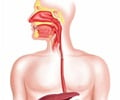Rhode Island Hospital researchers say that they have identified genetic proteins that may help detect people who are likely to progress to oesophageal cancer.
Rhode Island Hospital researchers say that they have identified genetic proteins that may help detect people who are likely to progress to oesophageal cancer.
Writing about their breakthrough in the journal Clinical Cancer Research, the researchers have pointed out that Barrett's esophagus (BE) is a common pre-cancerous condition of the lower oesophagus.They say that the presence of this condition increases the risk of developing esophageal adenocarcinoma (EAC), the most common form of oesophageal cancer.
"Identification of biomarkers capable of distinguishing the grade of Barrett's esophagus-associated dysplasia, as well as identifying patients who are most likely to progress to cancer, would be extremely valuable tools for both surgical pathologists and gastroentorologists," says the lead author of the study, Dr. Murray Resnick.
The progression of BE to EAC occurs in a series of steps from low-grade dysplasia-earliest morphological sign of pre-cancer-to high-grade dysplasia (HGD), and about 50 per cent of the patients who experience HGD progress to EAC.
Morphological analysis of oesophageal biopsies by light microscopy is presently considered the gold standard for identifying HGD. Distinguishing between LGD and HGD, however, can be challenging for pathologists to detect using light microscopy alone.
Resnick says: "As pathologists, our primary goal was to identify candidate biomarker proteins suitable for the generation of specific antibodies that could detect these proteins using immunohistochemical diagnostic techniques that are readily available in all pathology departments."
Advertisement
The researchers used state-of-the-art molecular techniques, including laser capture microdissection followed by gene expression analysis, to identify a number of potential biomarkers.
Advertisement
Source-ANI
SRM/SK











